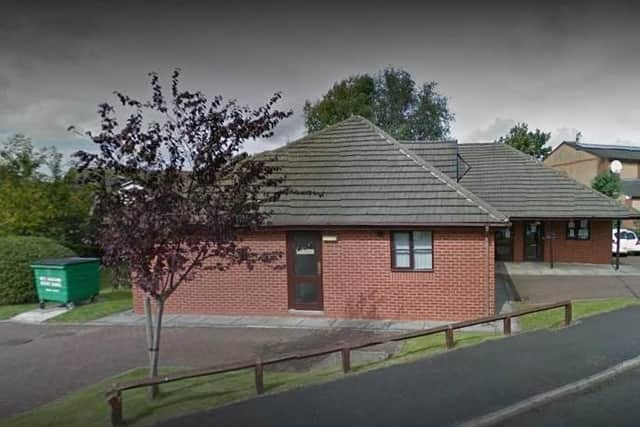Tribunal into conduct of GP after death of patient with phobia of doctors
and live on Freeview channel 276
Identified only as Patient A, the 48-year-old had a cough for several months and went to see a doctor at Parbold Surgery in March 2017.
She was diagnosed as having a chest infection, but her condition deteriorated throughout that day and she was rushed to hospital, where she died in the early hours of the following day.
Advertisement
Hide AdAdvertisement
Hide AdThe behaviour of the GP whom she saw that day - Dr Rebekah Mason, who was a junior doctor at the surgery - is now the subject of a medical practitioners’ tribunal.


She faces a series of allegations about what happened during that consultation and changes made to records of the appointment afterwards.
As the hearing began in Manchester this week, Victoria Gainza, representing the General Medical Council, explained how Patient A started to have a tickly cough in December 2016.
She was still coughing several months later, which was causing difficulty in her being able to sleep, and her breathing had become laboured, leaving her struggling to do anything without becoming out of breath.
Advertisement
Hide AdAdvertisement
Hide AdHer partner said he would arrange for her to see a GP and she had panic attacks during the night at the thought of that.
He phoned Parbold Surgery shortly after 8am on March 24, 2017 and explained Patient A’s symptoms and her phobia.
He was offered an appointment with Dr Mason at 8.45am or an appointment later that morning which may be with a more senior doctor, and agreed they would see Dr Mason.
Patient A and her partner went to the appointment, with records showing they were seen at 8.48am and left at 9.02am.
Advertisement
Hide AdAdvertisement
Hide AdThe tribunal heard that whether Dr Mason’s conduct fell below the standard expected will depend on whether members accept the partner's account of that consultation or Dr Mason’s account.
Ms Gainza explained that his version of events is that he had to help his partner get dressed for the appointment, as she was struggling to breathe and very tired, and she was breathless as they walked from the waiting room to the GP’s room.
He said he did most of the talking during the appointment because she was struggling to speak, and said Patient A had been very breathless, taken time off work and felt very tired.
Dr Mason tested her oxygen saturation levels, but Patient A's partner claimed she said the reading could not be right because it was “too low”, blaming Patient A’s hands for being “cold and shaky”. Dr Mason denies saying this, the tribunal heard.
Advertisement
Hide AdAdvertisement
Hide AdPatient A did not want Dr Mason to take her blood pressure using an arm cuff, so she did not do it.
The partner claimed Dr Mason did not tell them what to do if Patient A's symptoms became worse.
The hearing was told that Dr Mason did not believe Patient A was showing shortness of breath on exertion, after walking 17m from the waiting room to the consultation, and she disputed the partner's account that he did most of the talking.
In her statement, she said Patient A was talking in full sentences and was not out of breath.
Advertisement
Hide AdAdvertisement
Hide AdShe said it was difficult to get a reading on the oximeter because Patient A’s hands were cold and shaking, but there were readings consistently in the 90s so she did not have concerns.
She says she told Patient A to get help if her shortness of breath on exertion got worse or if she had shortness of breath on rest, Ms Gainza said.
Patient A was diagnosed as having a chest infection and prescribed antibiotics and an inhaler.
She went home after the appointment, but her condition deteriorated during the day and an ambulance was called that evening.
Advertisement
Hide AdAdvertisement
Hide AdShe was taken to Southport Hospital for treatment, but she died at 1.45am on Saturday, March 25 after a cardiac arrest. A post-mortem examination showed she died from acute respiratory syndrome, secondary to acute viral pneumonitis.
The hearing was told Dr Mason became aware that Patient A had died on Monday, March 27 when information was provided by the hospital.
She phoned her partner the following day to pass on her condolences, with the phone passed to his niece during the call.
The content of that conversation is also disputed, including an allegation that Dr Mason said the oxygen saturation level had been “unusually low”.
Advertisement
Hide AdAdvertisement
Hide AdAfter the phone call, Dr Mason made some amendments to the original record of her appointment with Patient A, the tribunal heard.
Ms Gainza said these were later identified by looking at the audit trail, but had not been marked as being made retrospectively by Dr Mason.
However, she did explain that an icon on the system used by the GP practice showed there had been changes to the original record.
Dr Mason faces 12 allegations in total, relating to the consultation itself and changes to the record of that appointment.
Advertisement
Hide AdAdvertisement
Hide AdThey include failing to explain the importance of obtaining a blood pressure reading, not recognising the seriousness of Patient A’s combination of symptoms, not providing any appropriate follow-up to the consultation and making amendments to the records after being informed Patient A had died.
Proceeding
Thanks for reading. If you value what we do and are able to support us, a digital subscription is just £1 for your first month. Try us today by clicking here
